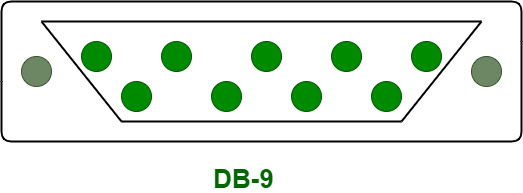Difference between Serial Port and Parallel Ports
Last Updated :
06 Jan, 2023
Prerequisite – Introduction of Ports in Computers
1. Serial Port: A serial port is an interface that is used for connecting the serial lines to attain the serial communication. These ports can dock a 9-pin D-shaped connector that connects to the transmission line, is called DB-9 connectors. Serial communication gained by single wire and only the single stream of data is transferred from one end to other. Therefore, like parallel transmission, in serial transmission data speed mismatch is not a problem. The length of the wire can be increased as needed. The transmission speed of serial port is comparatively low as compared to parallel port transmission speed. Serial ports are typically implemented in the modems, connecting devices, controllers, mouse and also in security cameras. DB-9 pin connector diagram is given below.

2. Parallel Port: Unlike serial port, a parallel port can move a set of 8 bits at a time on eight different wires. That’s why it is faster in comparison to the serial communication. Unlike serial port, It uses a 25 pin connector that is called DB-25 connector. To eliminate crosstalk and errors, all bitstreams need to transfer data at the same speed in parallel communication. But, that is impractical. Therefore, for this reason, transmission lines are preferred to be short in parallel communication. Parallel ports are typically implemented in zip-drives, printers, hard drives, CD-ROM drives, etc. DB-25 pin connector diagram is given below. 
Difference between Serial port and Parallel Ports:
| S.NO |
Serial Port |
Parallel Port |
| 1. |
Serial port is used to achieve serial transmission. |
While parallel port is used to achieve parallel transmission. |
| 2. |
The transmission speed of serial port is comparatively low as compared to parallel port transmission speed. |
While transmission speed of parallel port is higher than serial port transmission speed. |
| 3. |
In serial port communication less number of wires are used. |
While in parallel port communication more number of wires are used as compared to serial port. |
| 4. |
A serial port is capable of delivering the single stream of data. |
While a parallel port is capable of delivering multiple streams of data. |
| 5. |
Serial port send a bit after another byte at a time. |
While parallel ports send multiple bits at once. |
| 6. |
In a serial port, male ports are involved. |
While in a parallel port, female ports are involved. |
| 7. |
Serial ports are typically implemented in modems, connecting devices, security cameras and controllers. |
Parallel ports are typically implemented in zip-drives, printers, hard drives, CD-ROM drives, etc. |
Like Article
Suggest improvement
Share your thoughts in the comments
Please Login to comment...